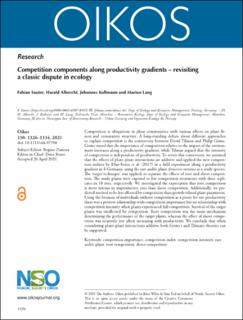Competition components along productivity gradients – revisiting a classic dispute in ecology
Peer reviewed, Journal article
Published version
Permanent lenke
https://hdl.handle.net/11250/2823993Utgivelsesdato
2021-06-04Metadata
Vis full innførselSamlinger
Sammendrag
Competition is ubiquitous in plant communities with various effects on plant fitness and community structure. A long-standing debate about different approaches to explain competition is the controversy between David Tilman and Philip Grime. Grime stated that the importance of competition relative to the impact of the environment increases along a productivity gradient, while Tilman argued that the intensity of competition is independent of productivity. To revisit this controversy, we assumed that the effects of plant–plant interactions are additive and applied the new competition indices by Díaz-Sierra et al. (2017) in a field experiment along a productivity gradient in S-Germany, using the rare arable plant Arnoseris minima as a study species. The ‘target technique' was applied, to separate the effects of root and shoot competition. The study plants were exposed to five competition treatments with three replicates in 18 sites, respectively. We investigated the expectation that root competition is more intense in unproductive sites than shoot competition. Additionally, we predicted survival to be less affected by competition than growth-related plant parameters. Using the biomass of individuals without competition as a proxy for site productivity there was a positive relationship with competition importance but no relationship with competition intensity when plants experienced full competition. Survival of the target plants was unaffected by competition. Root competition was the main mechanism determining the performance of the target plants, whereas the effect of shoot competition was relatively low albeit increasing with productivity. We conclude that when considering plant–plant interactions additive both Grime's and Tilman's theories can be supported.

